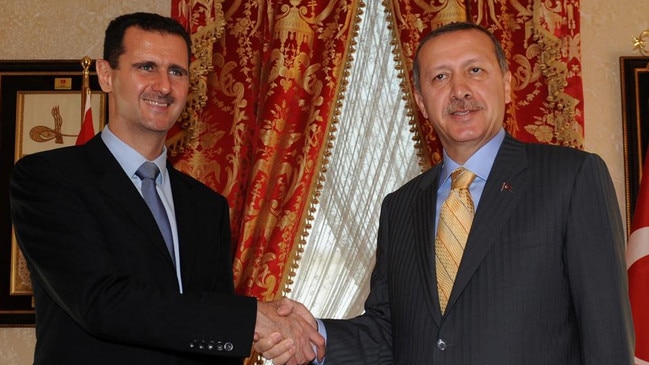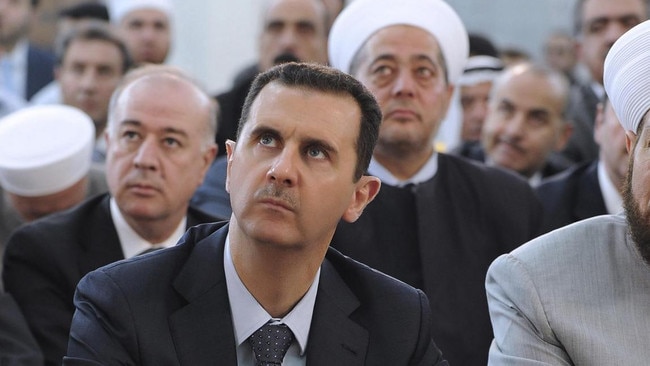Blow to ‘free Syria’ as Turkey’s Erdogan offers hand to Assad
The brutal Damascus regime – which has survived against all odds – may be forging a powerful ally as Turkey’s leader looks set to change sides.

Twelve years ago Rami Jarrah, a young Syrian with dreams of a democratic future, began tweeting about protests in Damascus.
Soon President Bashar al-Assad was being condemned for his violent crackdown and countries from the US to Qatar were throwing their weight behind the opposition.
Within five years, however, Syria’s revolution was engulfed by infighting and extremism and former supporters drifted away, quietly conceding that Assad was staying put even as the war churned on.
Now the Syrian opposition’s last powerful ally, Turkey, is changing course, moving towards reconciliation with Damascus.
The Turkish and Syrian defence ministers met in Moscow last week, the first ministerial-level face-to-face since 2011, and the respective foreign ministers are expected to meet this month. Above all, President Recep Tayyip Erdogan has hinted that he is ready to meet Assad.

The turnaround is “not a surprise, but it is still a huge slap in the face for those who aspire to a free Syria”, Jarrah, now in exile in Germany, said.
Yet he believed that the Syrian diaspora in Turkey also had made mistakes.
“Syrian politicians, activists and journalists treated Turkey as a one-party state and ruled out building relations with the Turkish opposition parties. This created resentment towards Syrians from Turks who oppose Erdogan and ultimately left their fate in the hands of one very pragmatic politician.”
Although Russian President Vladimir Putin is pushing for the detente, Erdogan has his own domestic motivations.
There is mounting anger in Turkey over the 3.6 million Syrian refugees it is hosting and opinion polls show that an overwhelming majority of Turks want them gone, something Turkey’s secularist opposition parties, sympathetic to Assad by inclination, have long campaigned on.
Mr Erdogan, a political Islamist, initially was welcoming to the Syrians and other Arab Spring exiles and they, in turn, largely deified him, even as he slid towards his own kind of authoritarianism.
Turks believe that, should Syrians remain and take Turkish citizenship, as several hundred thousand have done already, they will become an electorally significant bloc.
As Turkey’s economic woes have mounted and as regional political tides have turned against him, Mr Erdogan has sought to rebuild bridges with his neighbours and to present himself as the leader who will return Syrians in Turkey to their country.
In recent months he has met the leaders of Saudi Arabia and the United Arab Emirates and has made overtures to Egypt.
Mr Erdogan also has restored diplomatic relations with Israel after years of disputes over Turkey’s links with Hamas and Israel’s treatment of the Palestinians.

Syria, however, is the real prize. According to Omer Onhon, Turkey’s last ambassador to Syria, who left his post in 2012 when diplomatic ties were cut, the country “is unique because its problems affect people on the street in Turkey directly, particularly the refugee issue. This may even affect how people vote.”
The depth and complexity of the rift, spanning Turkey’s support for Islamist militias and Assad’s co-operation with Kurdish fighters, means that full reconciliation will be difficult. The refugees are unlikely to leave Turkey quickly, even if a deal is struck.

Perception is what politicians of all stripes are banking on.
Umit Ozdag, a veteran nationalist, recently set up the Victory Party on the sole issue of expelling refugees. Kemal Kilicdaroglu, leader of the main opposition party, will attend a “repatriation ceremony” in Istanbul this weekend as some Syrians board a bus to return to their homeland.
Syria’s political opposition, which is based in Istanbul, has been stuffed with pro-Turkey figures in recent years. It did not respond to a request for comment.
The Times






To join the conversation, please log in. Don't have an account? Register
Join the conversation, you are commenting as Logout